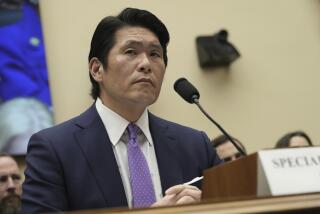Bybee is silent on interrogation memos
- Share via
A federal judge who provided the Bush administration with legal advice on what constitutes torture declined to respond Thursday to a letter from the Senate Judiciary Committee chairman calling on him to explain his actions to the American public.
Judge Jay S. Bybee, of the U.S. 9th Circuit Court of Appeals, was head of the Justice Department’s Office of Legal Counsel when he described the intensity of pain that could legally be inflicted.
The interrogation methods, including waterboarding, have been denounced by the Obama administration, human rights groups and foreign allies as illegal torture.
Bybee has kept a low profile since the memos were released by President Obama last month, breaking his silence only in an e-mail to the New York Times in which he defended his guidance on interrogating terrorism suspects as “a good-faith analysis of the law.”
On Thursday, law clerks for the judge said variously that Bybee would respond to an appeal by Chairman Patrick J. Leahy (D-Vt.) to appear before the Senate Judiciary Committee; that he would explain his reasoning in a statement to the San Francisco-based appeals court; and that he would have nothing more to say to anyone on the subject.
“My impression is that there won’t be any further statements,” law clerk Keith Woffinden said, apologizing for the contradictory messages being sent by staffers.
In his e-mailed statement Tuesday to the New York Times, Bybee disputed published reports quoting former law clerks and academics saying that he had privately expressed regret over his legal work for the Bush administration.
He told the newspaper that he would have done some things differently -- approaching his analysis with an eye toward helping the public better understand how he reached his conclusions -- in light of recent criticism.
The judge’s justification has only fueled critics who say his reading of a U.S. statute and international accords banning torture was deliberately skewed to accommodate Bush administration officials who wanted permission to cross the legal line.
“It surprises, concerns, sickens and depresses me,” Christopher Blakesley, a law professor at the University of Nevada, Las Vegas, said of Bybee’s defense of the August 2002 memos. “I am surprised that he talked at all at this point.”
Blakesley said he was also “saddened because I truly believed from what I know of him over the years that he would have repudiated the memos along with all that surrounded and came from this sordid situation. Perhaps one day he will.”
In the view of John Parry, a professor at Lewis & Clark Law School in Portland, Ore., who has written extensively on torture, Bybee’s legal reasoning was suspect and the memos “unbalanced.”
“They do not consider any arguments that might detract from their conclusions, and they cite irrelevant or misleading authority,” Parry said. “Perhaps worse, they fail to provide sound legal advice. Instead, they read as if they were meant to provide cover for decisions that had already been taken.”
University of San Diego law professor Shaun Martin, who follows and analyzes Western appeals courts, said he was confident Bybee wouldn’t leave the bench of his own accord.
“My sense is that Judge Bybee thinks what he did was right but that it was expressed poorly. That’s not something you resign over,” Martin said.
Marjorie Cohn, a law professor at Thomas Jefferson School of Law in San Diego, disagreed.
“He can’t ignore it,” Cohn said of the growing storm around the judge. “Bybee has liability on several different levels. There may well be criminal investigations and prosecutions, if not by the United States, by other countries.”
A Spanish judge has announced a criminal investigation on behalf of foreign terrorism suspects, including five Spaniards.
Bybee, John C. Yoo and Steven G. Bradbury, all former Bush administration lawyers, are under investigation by the Justice Department’s Office of Professional Responsibility.
--
More to Read
Sign up for Essential California
The most important California stories and recommendations in your inbox every morning.
You may occasionally receive promotional content from the Los Angeles Times.











